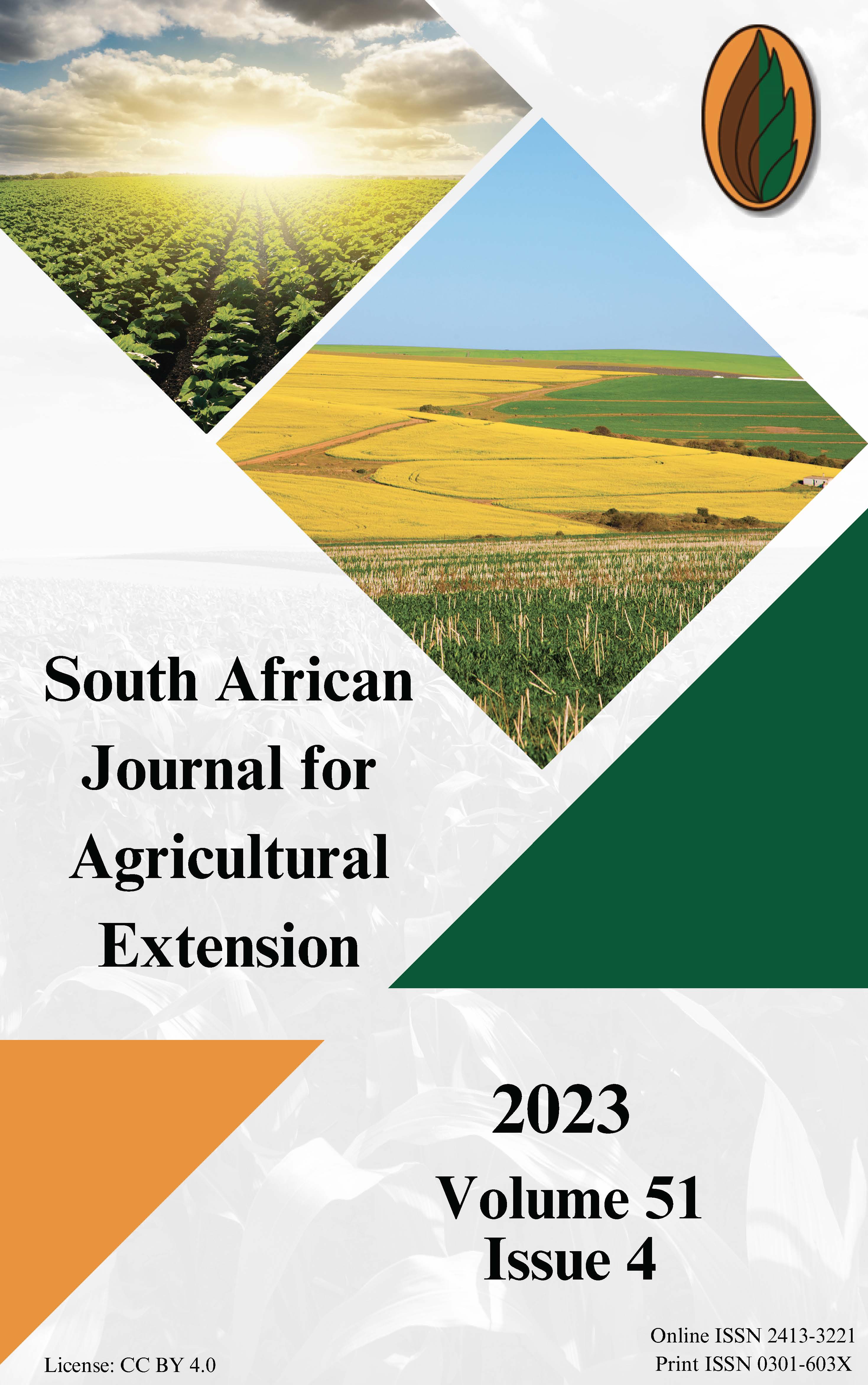The Operational Elements of the Vegetable Cooperatives: The Case of Agricultural Cooperative Societies in King Sabata Dalindyebo Local Municipality, Eastern Cape Province
DOI:
https://doi.org/10.17159/2413-3221/2023/v51n4a12530Keywords:
Farm Management, Record Keeping, Training, Constitution, Decision Making, ExtensionAbstract
Cooperatives are typically established to help create jobs and improve their members' economic and social conditions, among various other roles. Farmers’ cooperative societies play a vital role in enhancing the livelihood of resource-poor farmers. The government has initiated various support programmes to assist agricultural cooperative societies to remain viable; however, many cooperatives continue to flounder while some have collapsed. This study identifies operational components like members' roles, cooperative constitutions and decision-making processes, record-keeping, education and training of members, farm and financial management and level of extension service involvement as critical roles in sustaining agricultural cooperatives. Therefore, this study's objective was to assess the key operational components of vegetable cooperative societies and the level of extension support provided to the cooperatives in the study area. Ten functional vegetable cooperatives in the municipality were purposively selected for the study. At the same time, data for the survey was obtained from the board of directors and members of the cooperatives. Data was collected using semi-structured questionnaires consisting of closed and open-ended questions. The presentation of results was done using simple descriptive statistical tools. The study outcome shows that about 50% of the cooperatives noted that members were largely involved in the daily running of the cooperatives, governance, and decision-making processes. However, many cooperatives are constrained by the lack of training of its members on conflict resolutions (90%), with about 30% and 40% not receiving training on record keeping and financial management, respectively. The role of extension services towards the sustainability of the cooperatives is crucial. Most (80%) of the cooperatives indicated some level of interaction between the cooperatives and extension personnel, albeit the need to improve the frequency of extension visits, training, and follow-up appointments. The result of this study implies that cooperatives in the region need to improve in key operational areas. Extension personnel need to be more available to support cooperative activities effectively.
Downloads
References
ABATE, G.T., FRANCESCONI, G.N. & GETNET, K., 2014. Impact of agricultural cooperatives on smallholders’ technical efficiency: empirical evidence from Ethiopia. Annals of Pub. Coop. Eco., 85(2): 257–286. DOI: https://doi.org/10.1111/apce.12035
ABEBAW, D. & HAILE, M.G., 2013. The impact of cooperatives on agricultural technology adoption: empirical evidence from Ethiopia. Food Pol., 38: 82–91. DOI: https://doi.org/10.1016/j.foodpol.2012.10.003
ANANIA, P. & RWEKAZA, G.C., 2018. Cooperative education and training as a means to improve performance in cooperative societies. Sumerianz. J. Soc. Sci., 1(2): 39–50.
ARAYESH, M.B., 2017. The relationship between extension educational and psychological factors and participation of agricultural cooperatives’ members (case of Shirvan Chardavol county, Ilam, Iran). Int. J. Agric. Man. Dev., 7(1): 79–87.
CHEBET, M. & KENNEDY, O.B.M., 2019. Effect of budgeting on financial sustainability of dairy cooperative societies in Uasin Gishu County, Kenya. Int. J. Recent Res. Interdisciplinary Sci. (IJRRIS)., 6(4): 1-15.
CHEPKWEI, A.K., WANYOIKE, D. & KOIMA, J., 2017. Influence of strategic leadership on effective strategy implementation among savings and credit cooperative societies in Kenya. Eur. J. Bus. Strategic Man. (EJBSM)., 2(9): 55–70. DOI: https://doi.org/10.47941/jbsm.220
CHERUIYOT, T.K. & OGENDO, S.M., 2012. Effect of savings and credit cooperative societies strategies on member’ s savings mobilization in Nairobi, Kenya. Int. J. Bus, Com., 1(11): 40–63.
CHIBANDA, M., ORTMANN, G.F. & LYNE, M.C., 2009. Institutional and governance factors influencing the performance of selected smallholder agricultural cooperatives in KwaZulu-Natal. Agrekon., 48(3): 293–301. DOI: https://doi.org/10.1080/03031853.2009.9523828
DEPARTMENT OF AGRICULTURE FORESTRY & FISHERIES., 2010. Guidlines for establishing agricultural cooperatives. Pretoria: Government Printer.
DEPARTMENT OF AGRICULTURE FORESTRY & FISHERIES., 2014. Annual report 2013/14. Pretoria: Government Printer.
DEPARTMENT OF AGRICULTURE FORESTRY & FISHERIES., 2016. Annual report 2015/16. Pretoria: Government Printer.
DEPARTMENT OF AGRICULTURE FORESTRY & FISHERIES., 2017. Annual report 2016/17. Pretoria: Government Printer.
DEPARTMENT OF TRADE & INDUSTRY., 2012. Integrated strategy on the development and promotion of cooperatives. Pretoria: Government Printer.
EASTERN CAPE PLANNING COMISSION., 2014. Eastern Cape vision 2030 provincial development plan. Bisho: Government Printer.
ELAHI, E., ABID, M., ZHANG, L., UL HAQ, S. & SAHITO, J.G.M., 2018. Agricultural advisory and financial services; farm level access, outreach and impact in a mixed cropping district of Punjab, Pakistan. Land Use Pol., 71: 249–260. DOI: https://doi.org/10.1016/j.landusepol.2017.12.006
FICI, A., 2012. Cooperative identity and law. DOI: https://doi.org/10.2139/ssrn.2005014
GARNEVSKA, E., LIU, G. & SHADBOLT, N.M., 2011. Factors for successful development of farmer cooperatives in Northwest China. Int. Food Agribus. Man. Rev., 14(4): 69–79.
GELO, D., MUCHAPONDWA, E. & SHIMELES, A., 2017. Return to investment in agricultural cooperatives in Ethiopia. Ethiopia.
HERBEL, D., ROCCHIGIANI, M. & FERRIER, C., 2015. The role of the social and organisational capital in agricultural co- operatives ’ development practical lessons from the CUMA movement. J. Co-op. Org. Man., 3: 24–31. DOI: https://doi.org/10.1016/j.jcom.2015.02.003
KESHELASHVILI, G., 2017. Characteristics of management of agricultural cooperatives in Georgia. In 32nd International Academic Conference. Georgia. DOI: https://doi.org/10.20472/IAC.2017.032.020
KING SABATA DALINDYEBO., 2014. Integrated development plan 2013-14 review final draft. Mthatha.
KUMAR, V., WANKHEDE, K.G. & GENA, H.C., 2015. Role of cooperatives in improving livelihood of farmers on sustainable basis. American J. Edu. Res., 3(10): 1258–1266.
LEVY, W., 2017. Cooperatives: Farmers work together for a better future: Technical Centre for Agricultural and Rural Cooperation (CTA). Available from http://www.jstor.org/stable/44190947.
LOWE, A., NJAMBI-SZALAPKA, S. & PHIONA, S., 2019. Youth associations and cooperatives: Getting young people into work. London.
MERSHA, D. & AYENEW, Z., 2018. Financing challenges of smallholder farmers: a study on members of agricultural cooperatives in Southwest Oromia Region, Ethiopia. African J. Bus. Manag., 12(10): 285–293. DOI: https://doi.org/10.5897/AJBM2018.8517
MSIMANGO, B. & OLADELE, O.I., 2017. Factors influencing farmers’ participation in agricultural cooperatives in Ngaka Modiri Molema District. J. Hum. Eco., 44(2): 113–119. DOI: https://doi.org/10.1080/09709274.2013.11906649
MUSAH, A. & IBRAHIM, M., 2014. Record keeping and the bottom line: Exploring the relationship between record keeping and business performance among small and medium enterprises (SMEs) in the Tamale Metropolis of Ghana. Res. J. Fin. Acc., 5(2): 107-117.
MZUYANDA, C., 2014. Assessing the impact of primary agricultural cooperative membership on smallholder farm performance (crops) in Mnquma Local Municipality of the Eastern Cape Province. Masters Dissertation, University of Fort Hare.
NGANWA, P., LYNE, M. & FERRER, S., 2010. What will South Africa’s new cooperatives Act do for small producers? an analysis of three case studies in KwaZulu-Natal. Agrekon., 49(1): 39–55. DOI: https://doi.org/10.1080/03031851003798561
ORTMANN, G.F. & KING, R.P., 2006. Small-scale farmers in South Africa: can agricultural cooperatives facilitate access to input and product markets? Available from http://purl.umn.edu/13930.
ORTMANN, G.F. & KING, R.P., 2007. Agricultural cooperatives I: History, theory and problems. Agrekon., 46(1): 18–46. DOI: https://doi.org/10.1080/03031853.2007.9523760
REBELO, J.F., LEAL, C.T. & TEIXEIRA, Â., 2017. Management and financial performance of agricultural cooperatives: a case of Portuguese olive oil cooperatives. Revista de Estu. Coop., 123: 225–249. DOI: https://doi.org/10.5209/REVE.53243
THABA, S.C. & MBOHWA, C., 2015. The nature, role and status of cooperatives in South African context. In World Congress on Engineering and Computer Science. V2. San Francisco.
THABA, K., ANIM, F.D.K. & TSHIKORORO, M., 2017. Analysis of factors affecting proper functioning of smallholder agricultural cooperatives in the Limpopo Province of South Africa. J. Hum., Eco., 54(3): 150–157. DOI: https://doi.org/10.1080/09709274.2016.11906997
TORTIA, E.C., 2018. The firm as a common. Non-divided ownership, patrimonial stability and longevity of cooperative enterprises. Sustainability., 10. DOI: 10.3390/su10041023. DOI: https://doi.org/10.20944/preprints201803.0031.v1
TSHUNUNGWA, B.G., 2013. The role of agricultural cooperatives in developing previously disadvantaged black rural communities in the Eastern Cape Province since 2005: The case study of Cannon farm in Queenstown. Degree Mini-dissertation, Nelson Mandela University.
TWALO, T., 2012. The state of cooperatives in South Africa. Available from http://www.lmip.org.za/sites/default/files/documentfiles/13 TWALO_Cooperatives.pdf.
VERHOFSTADT, E. & MAERTENS, M., 2015. Can agricultural cooperatives reduce poverty? Heterogeneous impact of cooperative membership on farmers’ welfare in Rwanda. Applied Eco. Persp. Pol., 37(1): 86–106. DOI: https://doi.org/10.1093/aepp/ppu021
YANG, H., KLERKX, L. & LEEUWIS, C., 2014. Functions and limitations of farmer cooperatives as innovation intermediaries: findings from China. Agric. Sys., 127: 115–125. DOI: https://doi.org/10.1016/j.agsy.2014.02.005
YUSUF, S.F.G., MASIKA, P. & IGHODARO, D.I., 2013. Agricultural information needs of rural women farmers in Nkonkobe Municipality: the extension challenge. J. agric. Sci., 5(5): 107–113. DOI: https://doi.org/10.5539/jas.v5n5p107
ZHANG, L. & LIU, S., 2018. Financial management in new types of agricultural businesses: a case study of farmer’s cooperatives in Weixian county. Asian Agric. Res., 10(3): 10–14.
Downloads
Published
Issue
Section
License
Copyright (c) 2023 A. Sohuma, S.F.G. Yusuf, O.O. Popoola

This work is licensed under a Creative Commons Attribution 4.0 International License.








.png)